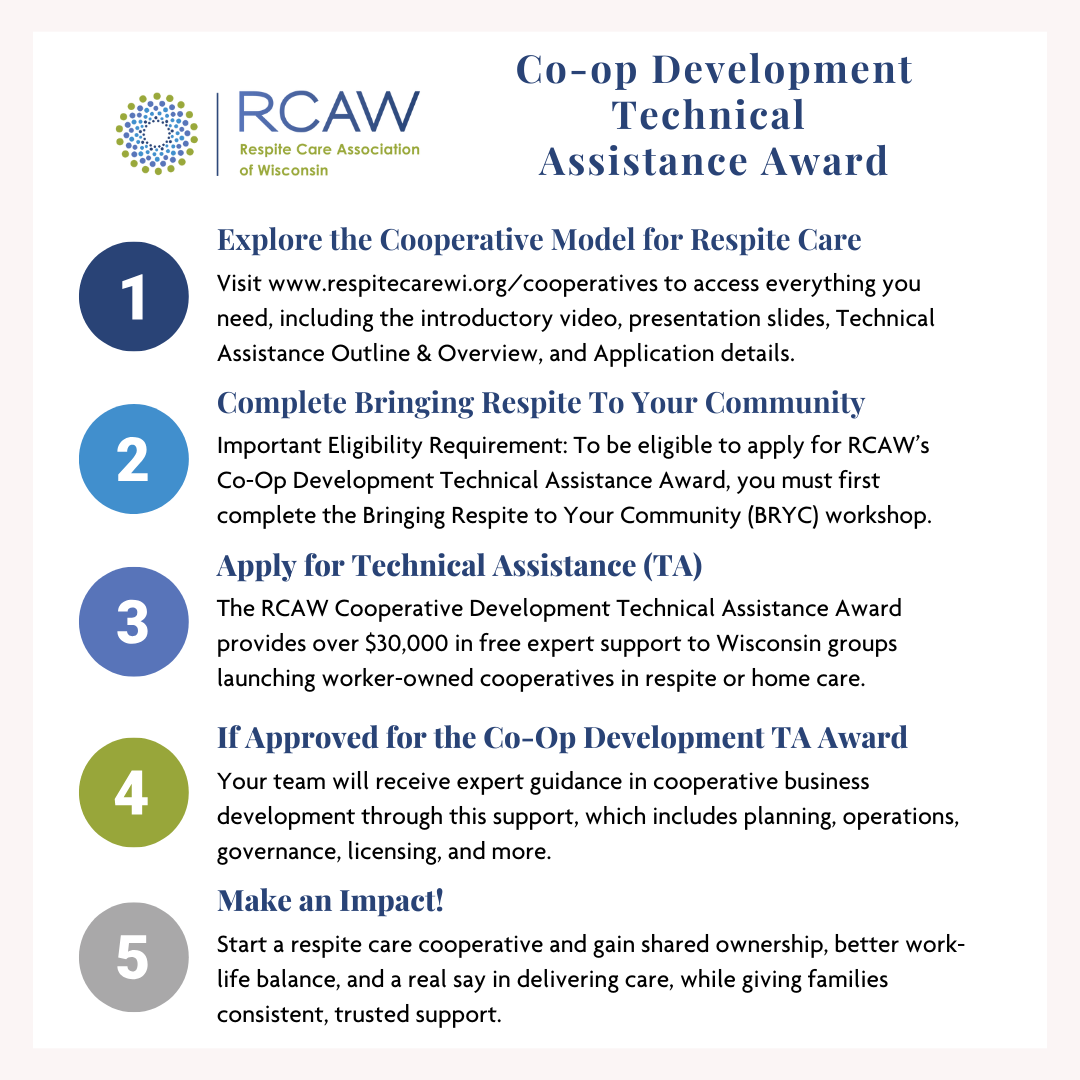RCAW is excited to announce a partnership to help expand respite programs in Wisconsin.
Imagine a workplace where you and your team make the decisions, share the profits, and create the kind of care environment you believe in. RCAW’s Co-op Development Technical Assistance Award gives you expert guidance to build your own worker-owned respite or home care cooperative in your community.
watch the video to learn more
Key Information
A cooperative or co-op is a business that is owned and democratically controlled by the members who use its services. Cooperatives are found across the U.S. in nearly every sector of the economy.
Members who use the cooperative own their co-op because they finance it in a variety of ways. They share in both the business risks and the business profits. Each cooperative determines the level of financial participation that is required to establish membership status in the co-op.
Members democratically control their cooperative by exercising the voting rights that come with membership. In Wisconsin, each member is typically entitled to one vote.
Members benefit from the cooperative based on their use of the co-op. All or part of a cooperative’s profits may be distributed proportionately, based on each member’s use, or patronage, of the co-op. (UW Center for Cooperatives)
The ICA Group offers a comprehensive analysis of the state’s home care landscape, identifying counties with the highest potential for new or expanded home care services. The assessment evaluates factors such as unmet consumer demand, workforce availability, income levels, and existing provider competition to determine market opportunities across Wisconsin.
This assessment serves as a valuable resource for organizations and individuals considering the development or expansion of home care services in Wisconsin, providing data-driven insights to inform strategic planning.
Want to explore the Worker Cooperative Model more deeply? We’ve made the presentation slides from May’s webinar available for you to explore and reference.
Click here to download the presentation and learn how cooperative care models can support sustainable, community-based respite programs.
The RCAW Cooperative Development Technical Assistance Award provides over $30,000 in free expert support to Wisconsin groups launching worker-owned cooperatives in respite or home care. Offered by RCAW in partnership with the UW Center for Cooperatives and the ICA Group, the program delivers personalized coaching and tools through four key phases:
Getting Started – Define your mission, vision, and roles; refine your business plan.
Feasibility & Planning – Conduct market research, plan staffing, and build a financial model.
Go-To-Market – Develop governance, bylaws, and funding strategies.
Launch Support – Prepare for legal setup, hiring, and marketing.
Eligibility: Groups must have at least 3 committed members and complete the BRYC workshop and co-op assignment before applying.
Timeline: Core phases take 6–8 months; full launch may take up to 18 months.
Learn more and download the doument by clicking here.
Launch Your Own Respite Program with Confidence! By completing this form, you’re taking the first step toward creating meaningful change in your community. You’ll gain access to expert guidance, practical tools, and a proven framework to help you build and sustain a respite care program—whether volunteer-led or fully staffed.
Benefits include:
Free training and technical assistance
Personalized support from industry experts
Templates, resources, and planning guides
Eligibility for grants and cooperative startup support
Start with clarity, support, and a clear path forward.
Important Eligibility Requirement: To be eligible to apply for RCAW’s Co-Op Development Technical Assistance Award, you must first complete the Bringing Respite to Your Community (BRYC) workshop series. To learn more about BRYC, click here.
step-by-step resource
 You can download a copy of this image by clicking here.
You can download a copy of this image by clicking here.
Acknowledgments
RCAW would like to thank the subject matter experts from The ICA Group and the UW Center for Cooperatives, who have been instrumental to this process.
This program is supported by the Administration for Community Living (ACL), U.S. Department of Health and Human Services (HHS) as part of a financial assistance award totaling $2,042,074 with 75% percentage funded by ACL/HHS and $689,234 with 25% percentage funded by State of Wisconsin source(s). The contents are those of the author(s) and do not necessarily represent the official views of, nor an endorsement, by ACL/HHS, or the U.S. Government.